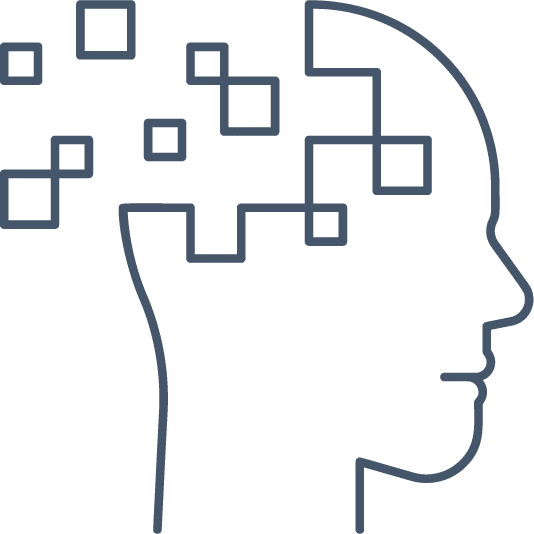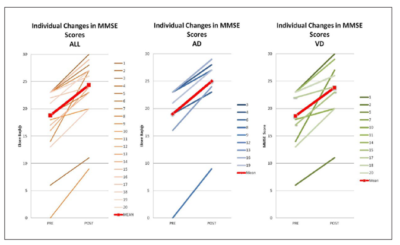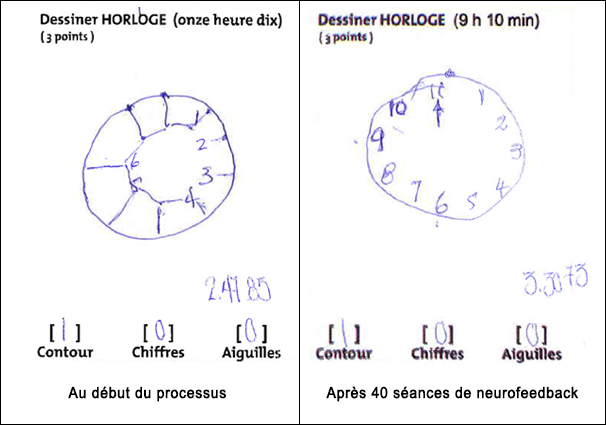Alzheimer / Dementia
What we can improve
Although no treatment is yet available to cure Alzheimer’s disease, several studies have shown that Neurofeedback can lead to improvements at different levels including working memory, cognitive processes, executive functions and sleep1. The studies carried out are still few, but the results obtained so far present a wave of encouragement.
Different regions of the brain are usually affected in Dementia or Alzheimer’s.
First, an infringement in the temporal lobes (located above the ears) and the hippocampus (located more in the center of the brain) will cause difficulties in memory and learning.
Dysfunctional frontal lobes can affect one’s planning, organizing, as well as their judgment.
Finally, when the parietal lobes (located on the upper back of the head) do not work properly, difficulties of understanding and logic can appear. Then it will be more difficult to follow the discussions and by express themselves clearly by using an appropriate vocabulary.
With Neurofeedback, we aim to stimulate the temporal regions (above the ears) as well as certain deep regions on each side that are involved in the memory such as the hippocampus and the cingulate gyrus.
- Functional improvement
- Better autonomy
- Improved memory
- Improvement of the quality of life
- Increased cognitive awakening
As previously mentioned, the approach used by Neuroperforma will not treat Alzheimer’s disease. However, as shown in the graphs below from the reference article, we can observe improvements in the Mini Mental State Examination (MMSE) scores, both in individuals with Alzheimer’s disease (AD) and those with vascular dementia (DV)
Knowing the necessary involvement of loved ones to bring individuals regularly in our clinics to do their training sessions, Neuroperforma now offers to go do the evaluations and training directly in residences. A minimum of registration is required as well as the collaboration of the institution to carry out these projects. Contact us for more information.
Here is a case from the Neuroperforma Clinic. In an Alzheimer’s test called MoCA, the neuropsychologist asks the individual to draw a clock with a specific time. We can notice a noticeable improvement between the test done at the beginning of the process and the one done after several training of Neurofeedback.
1. Clinical EEG and Neuroscience 2015
Quantitative EEG Neurometric Analysis Guided Neurofeedback Treatment in
Dementia: 20 Cases. How is Neurometric Analysis Important for the Treatment of
Dementia and a Biomarker?
See the article
Le trouble du déficit de l’attention avec ou sans hyperactivité (TDA/TDAH) est une condition neurodéveloppementale complexe qui toucherait 5 à 8 % des enfants. Il peut être décrit par une panoplie de symptômes liés à des dysfonctions ou à une pauvre maturation des lobes frontaux.

The WHO uses the term “dementia” and estimates that more than 50 million people worldwide suffer from dementia. About 477,000 people aged 65 and older experienced this disorder in Canada between April 2020 and March 2021 (Source: Government of Canada). With the aging Canadian population, the number of cases continues to rise.
Dementia is a complex syndrome that impairs cognitive functions such as memory, reasoning, and language. Generally, these cognitive impairments are followed by behavioral and emotional problems. Contrary to popular belief, dementia is not an inevitable part of aging. Dementia or Alzheimer’s disease causes the gradual degeneration of brain cells.
The most well-known symptoms of this condition are memory loss and progressive loss of autonomy. According to the WHO, there are three stages of progression in a case of Alzheimer’s dementia. In the initial stage, the person with dementia functions independently, with slight cognitive impairment. Then, they experience mild cognitive impairment but remain independent. Finally, the person with dementia needs assistance with daily tasks.
Other common symptoms of Alzheimer’s/dementia include:
- Disorientation in time and space.
- Difficulty in performing familiar tasks.
- Problems with language and communication.
- Changes in mood, behaviour, and personality.
- Need for more initiative and motivation.
- Agitation and restlessness.
- Paranoia and delusions.
- Hallucinations.
Urinary or fecal incontinence.
Diagnosis and treatment of Alzheimer’s disease
- Early diagnosis is crucial for better management of Alzheimer’s disease. It allows for the early initiation of treatment and the implementation of appropriate support measures. In most cases, the diagnosis is made based on a clinical evaluation that includes:
- Medical history.
- Physical examination.
- Neurological examination.
Cognitive assessment.
Additional blood tests, brain imaging (MRI or CT scan), and neuropsychological testing may also be necessary to confirm the diagnosis.
There is currently no cure for Alzheimer’s disease. However, several treatment options are available to alleviate symptoms and improve patients’ quality of life. These treatments include medication, cognitive stimulation, physical exercise, and psychosocial support.
Neurofeedback therapy can also be beneficial for individuals with Alzheimer’s disease. It is a non-invasive treatment that aims to improve brain function by providing real-time feedback on brain activity. Neurofeedback has been shown to help reduce cognitive decline and improve cognitive function in patients with Alzheimer’s disease.
- At Neuroperforma, we offer neurofeedback therapy for Alzheimer’s disease and other cognitive disorders. Our personalized treatment programs are designed to target the specific needs of each patient and promote optimal brain function. Contact us today to learn more about our services and how we can help you or your loved one with Alzheimer’s disease.
L’évaluation diagnostic de TDAH
Le diagnostic de TDAH n’est pas simple à poser et il n’y a aucun examen médical qui permet de le faire de manière précise. Le professionnel de la santé, notamment le neuropsychologe, qui pose le diagnostic de TDAH fait une évaluation complète de l’enfant et de son milieu de vie. Ce spécialiste peut s’intéresser à plusieurs éléments :
- le développement de l’enfant depuis sa naissance,
- son comportement à la maison, à l’école et ailleurs,
- ses symptômes (intensité et durée),
- ses difficultés à l’école ou lors de l’exécution des tâches.
Pour pouvoir déterminer si un enfant souffre d’un TDA ou TDAH, le neuropsychologue ou autre professionnel habileté à faire le diagnostic, peut utiliser les critères comportementaux élaborés par l’ouvrage Manuel diagnostique et statistique des troubles mentaux, 5e édition ainsi que des des outils psychométriques. Les tests psychologiques et les tests neuropsychologiques peuvent également aider à poser un diagnostic de TDAH.
À noter : L’électroencéphalogramme permet de préciser les profils d’activité électriques dans le cerveau pouvant apporter des problèmes au niveau des fonctions exécutives (concentration, attention, planification, organisation, impulsivité et agitation mentale ou physique). Toutefois, l’EEGq ne permet en aucun cas de poser le diagnostic de TDA ou de TDAH
Lorsqu’un enfant présente des troubles de l’attention ou de la concentration, cela peut être dû à un fonctionnement non-optimal de certaines régions du cerveau. Grâce au neurofeedback, on peut réduire progressivement les symptômes du TDA ou TDAH. Il est basé sur un traitement par conditionnement opérant permettant au cerveau d’identifier les fonctionnements électriques optimaux et de les corriger.
Le neurofeedback permet à votre cerveau de retrouver un fonctionnement optimal et ’améliorer vos comportements et compétences dans votre vie quotidienne. Neuroperforma dispose d’un équipement de dernière génération pour réduire les symptomes du trouble du déficit de l’attention avec ou sans hyperactivité. Votre professionnels vous proposera des séances régulières pour des résultats durables.
La prise de médicaments (psychostimulants) peut être nécessaire pour réduire les symptômes.
Il existe aussi d’autres méthodes naturelles comme la méditation et l’apprentissage de stratégies de travail et d’organisation efficaces. On peut citer le livre Mon cerveau a besoin de lunette (version pour enfants et version pour adulte).
La différence entre les deux, c’est que le TDA est une condition impliquant seulement des difficultés d’attention sans présence d’hyperactivité physique et mentale. En revanche, le TDAH est un trouble du déficit de l’attention avec hyperactivité. Les enfants souffrant de TDAH sont généralement perçus comme des personnes qui débordent d’énergie, qui ont la bougeotte et qui sont intenses ou impulsifs.
À la maison, les enfants atteints de TDAH font souvent des crises de colère. Ce qui crée des tensions importantes au sein de la famille. Les enfants TDA quant à eu sont souvent lunatique et ont de la difficulté à se mettre à la tâche. La période des devoirs peut être compliquée entre l’enfant et ses parents. À l’école, les enfants manifestant un TDA ou un TDAH présentent un risque d’avoir des difficultés d’apprentissage en lecture et pour accomplir les tâches. Ils peuvent se retrouver en situation d’échec s’ils ne sont pas rapidement pris en charge. Le TDAH affecte donc négativement la vie scolaire, sociale et familiale de celui qui en souffre.
Les enfants issus de familles présentant ce trouble sont susceptibles de développer les symptômes y afférant.
Lorem ipsum dolor sit amet, consectetur adipisicing elit, sed do eiusmod tempor incididunt ut labore et dolore magna aliqua. Ut enim ad minim veniam, quis nostrud exercitation ullamco laboris nisi ut aliquip ex ea commodo consequat. Nulla consectetur mauris ante, id aliquet ligula vehicula vel aliquam vitae orci et justo suscipit. Veniam quis nostrud exercitation ullamco laboris aliquip ex ea duis aute irure dolor kin reprehenderit in voluptate velit esse cillum dolore eu fugiat nulla pariatur excepteur sint occaecat.




